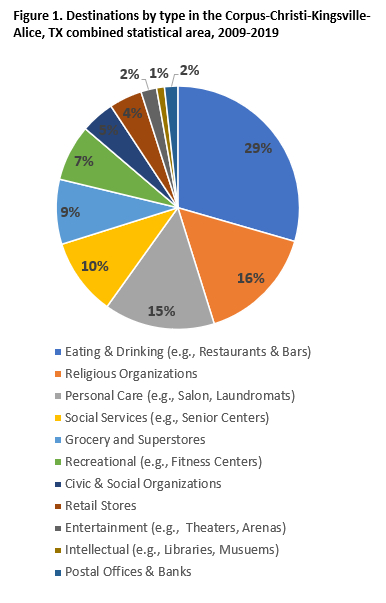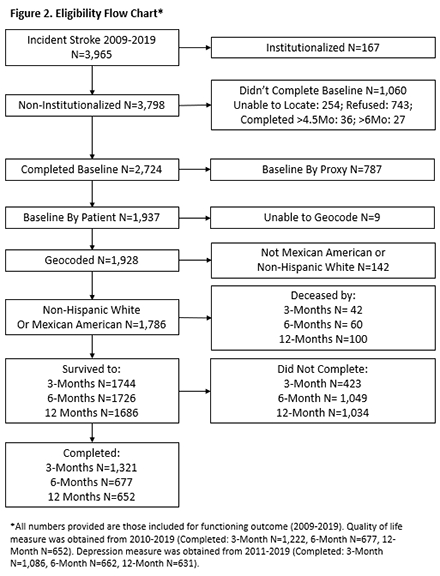Final ID: TP292
Number of destinations other than home and work within a half mile of residence and outcomes in first year poststroke
Abstract Body: Introduction: Residing in a neighborhood with greater destinations – places where you engage with the community aside from home and work – has been associated with more favorable functioning, and quality of life, particularly among moderate-severe stroke survivors. Prior studies were limited by cross-sectional design, confounding, or defining the neighborhood by census tract.
Hypothesis: Greater number of destinations within a 0.5-mile radius of the survivor’s residence is associated with more favorable poststroke functioning, quality of life, and depression over the first year.
Methods: We included non-Hispanic White and Mexican American first-ever stroke (ischemic or intracerebral hemorrhage) survivors enrolled in the Brain Attack Surveillance in Corpus Christi project (2009-19), a population-based cohort in Nueces County, Texas. Our exposure is the count of destinations within a 0.5 mile around the survivor’s residence at the time of their initial admission for stroke. We considered 11 types of destinations (Figure 1). Outcomes were assessed at approximately 3, 6, and 12-months poststroke and included functioning (activities of daily living (ADL)/instrumental ADL), health-related quality of life (abbreviated Stroke-Specific Quality of Life scale), and depression (Patient Health Questionnaire-8). We applied inverse probability weighting and multiple imputation to account for attrition and missing data. We fit adjusted linear mixed models, accounted for repeated measures, and considered interactions with follow-up time and stroke severity (NIH stroke scale - mild (<5) or moderate-severe (≥5)).
Results: We included 1,114 Mexican American and 672 Non-Hispanic White stroke survivors who completed the 3-month (N=1,321), 6-month (N=677), or 12-month interview (N=652) (Figure 2). Median age was 64 years, 55% male, and 74% with mild stroke. Stroke severity modified the association of destinations with functioning (p=0.091) and quality of life (p=0.048). Results are shown in Figure 3. No associations were observed between destinations and depression (p>0.05). Associations did not differ by follow-up time (p>0.25).
Conclusions: Among moderate-severe stroke survivors, greater number of nearby destinations was associated with more favorable functioning and quality of life in the first year poststroke. Future research is needed to determine if specific types of destinations may support poststroke outcomes.
Hypothesis: Greater number of destinations within a 0.5-mile radius of the survivor’s residence is associated with more favorable poststroke functioning, quality of life, and depression over the first year.
Methods: We included non-Hispanic White and Mexican American first-ever stroke (ischemic or intracerebral hemorrhage) survivors enrolled in the Brain Attack Surveillance in Corpus Christi project (2009-19), a population-based cohort in Nueces County, Texas. Our exposure is the count of destinations within a 0.5 mile around the survivor’s residence at the time of their initial admission for stroke. We considered 11 types of destinations (Figure 1). Outcomes were assessed at approximately 3, 6, and 12-months poststroke and included functioning (activities of daily living (ADL)/instrumental ADL), health-related quality of life (abbreviated Stroke-Specific Quality of Life scale), and depression (Patient Health Questionnaire-8). We applied inverse probability weighting and multiple imputation to account for attrition and missing data. We fit adjusted linear mixed models, accounted for repeated measures, and considered interactions with follow-up time and stroke severity (NIH stroke scale - mild (<5) or moderate-severe (≥5)).
Results: We included 1,114 Mexican American and 672 Non-Hispanic White stroke survivors who completed the 3-month (N=1,321), 6-month (N=677), or 12-month interview (N=652) (Figure 2). Median age was 64 years, 55% male, and 74% with mild stroke. Stroke severity modified the association of destinations with functioning (p=0.091) and quality of life (p=0.048). Results are shown in Figure 3. No associations were observed between destinations and depression (p>0.05). Associations did not differ by follow-up time (p>0.25).
Conclusions: Among moderate-severe stroke survivors, greater number of nearby destinations was associated with more favorable functioning and quality of life in the first year poststroke. Future research is needed to determine if specific types of destinations may support poststroke outcomes.
More abstracts on this topic:
Aerobic Physical Activity, Resistance Exercise, and Sedentary Times of Stroke Survivors
Lee Eung-joon, Kim Seung Jae, Bae Jeonghoon, Jeong Haebong
Bleeding Risks for Acute Ischemic Stroke Patients on Serotonergic Antidepressants and Anticoagulation/Dual Anti-Platelet TherapySimmonds Kent, Chavez Audrie, Ifejika Nneka
Readers' Comments
We encourage you to enter the discussion by posting your comments and questions below.
Presenters will be notified of your post so that they can respond as appropriate.
This discussion platform is provided to foster engagement, and simulate conversation and knowledge sharing.
You have to be authorized to post a comment. Please, Login or Signup.
Rate this abstract
(Maximum characters: 500)



